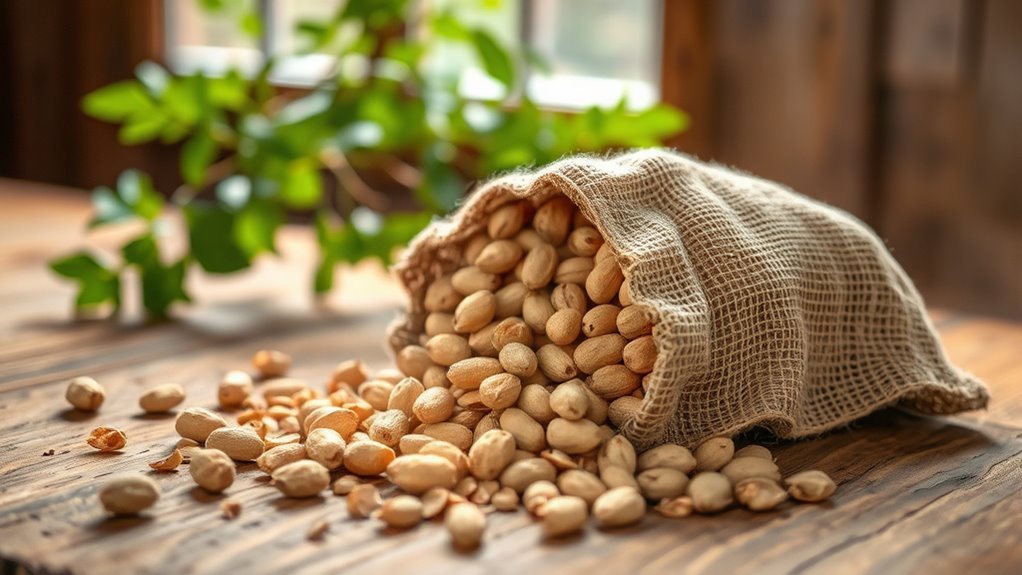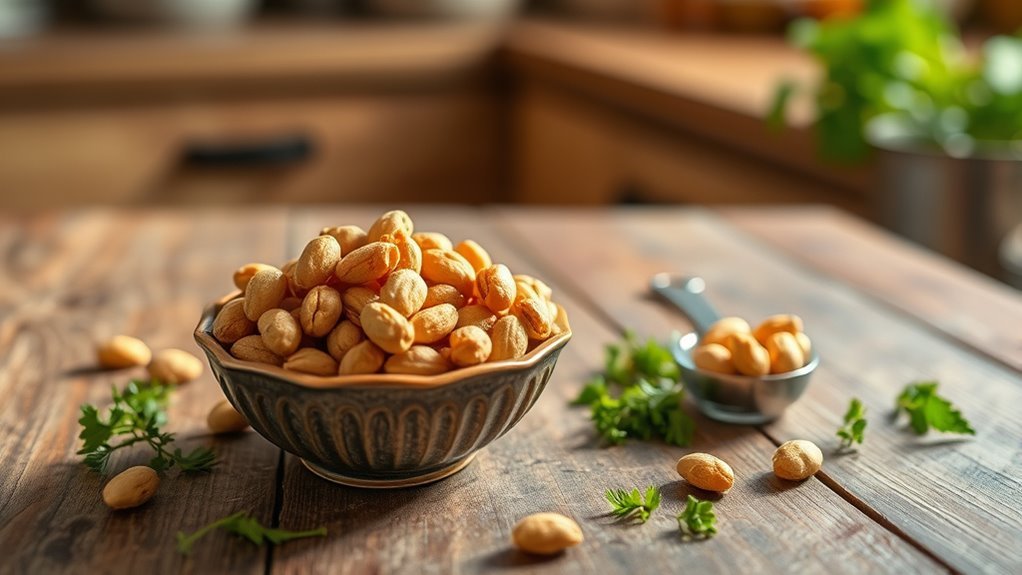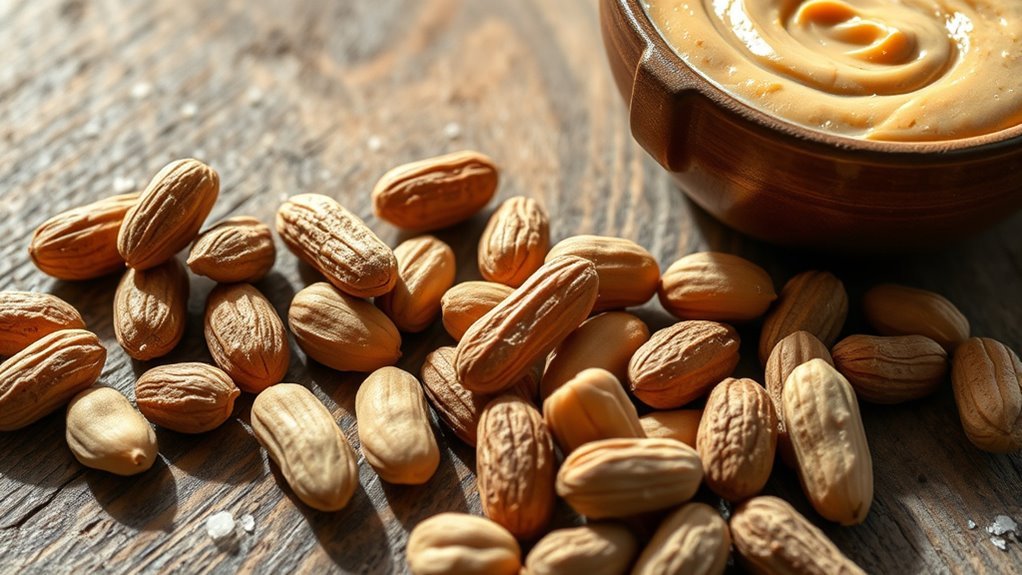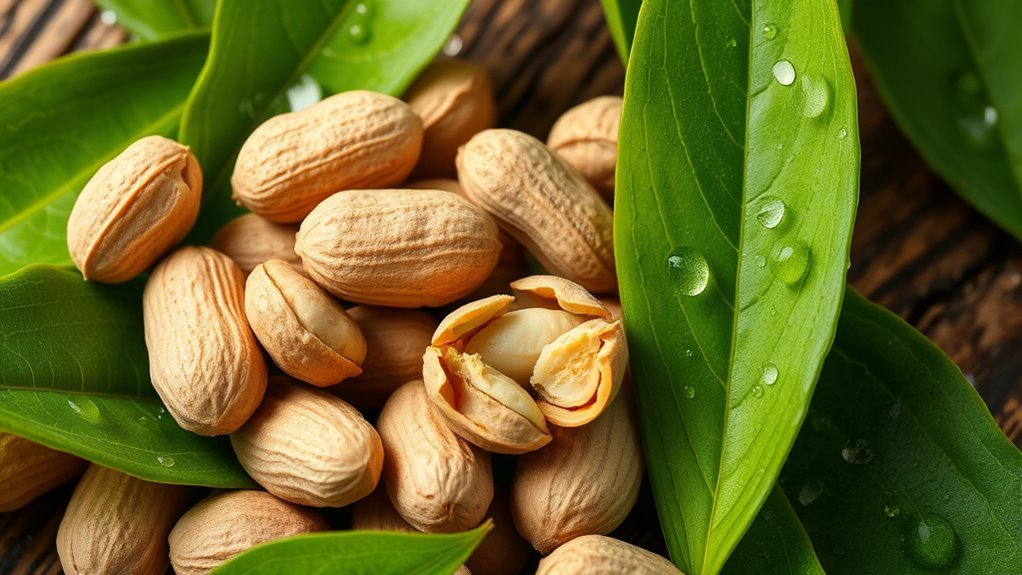Yes, peanuts can be included in a keto diet, but you need to watch your portions. With about 6 grams of net carbs per ounce, they can satisfy cravings while providing healthy fats and protein. However, since they contain more carbs than some nuts, it’s essential to keep servings to 1-2 ounces. Choosing natural peanut butter helps reduce added sugars. There’s more to learn about their health benefits and ways to enjoy them in your keto lifestyle.
Nutritional Profile of Peanuts

Peanuts are not just a tasty snack; they also pack a nutritious punch that fits well into a keto diet. When you explore peanut varieties, you’ll find they offer impressive nutritional density, making them a smart choice for health-conscious individuals. Rich in healthy fats, proteins, and essential vitamins, peanuts help you feel full and satisfied, supporting your energy needs without the carbs. For example, roasted, boiled, or raw peanuts all retain their health benefits, while providing diverse flavors and textures. Additionally, the fiber content in peanuts aids digestion, promoting overall wellness. By incorporating these legumes into your diet, you can enjoy a delicious snack that not only satisfies cravings but also contributes to your nutritional goals on a keto journey. Furthermore, peanuts’ low carb content makes them a keto-friendly option for those looking to maintain their diet effectively.
Carb Content and Ketogenic Guidelines

When considering snacks for a ketogenic diet, understanding carb content is vital. Peanuts, in moderation, can fit into your lifestyle since they contain about 6 grams of net carbs per ounce. This allows you to enjoy peanut butter as a satisfying snack alternative, provided you’re mindful of portion sizes. For those seeking variety, consider other low-carb options like cheese or olives. Remember, the key to maintaining ketosis is keeping your daily carb intake around 20-50 grams. By prioritizing snacks with low carbohydrate counts, you can still indulge in the creamy goodness of peanut butter while staying aligned with your dietary goals. Additionally, be aware that peanuts can affect insulin response, which is important for stable blood sugar levels. Balance is important, so be sure to explore various snack alternatives that complement your ketogenic journey.
Comparing Peanuts to Other Nuts

While many nuts can be enjoyed on a ketogenic diet, comparing peanuts to other options reveals some important differences in nutritional profiles. Peanuts, often classified as legumes, differ from traditional nuts like almonds and walnuts in fat and protein content. Here’s a quick comparison:
| Nut Type | Net Carbs (per 1 oz) | Protein (per 1 oz) |
|---|---|---|
| Peanuts | 4-6g | 7g |
| Almonds | 2-3g | 6g |
| Walnuts | 2g | 4g |
When considering peanut varieties, you’ll notice that they tend to have a higher carbohydrate content than some other nuts. This could influence your choices on a keto journey, depending on your specific goals. Additionally, monitoring portions is essential for maintaining ketosis, as excessive carb intake can hinder your progress.
Health Benefits of Peanuts
Although you might think of peanuts primarily as a snack, they actually offer a variety of health benefits that can complement your ketogenic lifestyle. Peanuts are rich in healthy fats, protein, and fiber, which can help keep you satiated and support your energy levels. They also contain essential vitamins and minerals like vitamin E, magnesium, and potassium, contributing to overall health. However, it’s important to be aware of peanut allergies, which can pose serious health risks for some individuals. If you’re not allergic, incorporating peanuts into your diet can provide heart-healthy benefits, potentially lowering cholesterol levels and reducing inflammation. Additionally, peanuts can be a great source of nutrient-dense snacks that support your keto diet. Just remember to consume them in moderation to balance your macros while enjoying their nutritional advantages.
Tips for Including Peanuts in a Keto Diet
Incorporating peanuts into your keto diet can be both enjoyable and beneficial with a few simple strategies. Start by experimenting with peanut recipes like peanut butter smoothies or keto-friendly peanut sauce for added flavor. Portion control is key; keep servings to around 1-2 ounces to maintain your carb limits. Additionally, choosing natural peanut butter can help minimize added sugars that may disrupt ketosis.
Here’s a quick reference for portion sizes and peanut types:
| Peanut Type | Serving Size (oz) | Net Carbs (per serving) |
|---|---|---|
| Raw Peanuts | 1 | 4.6 |
| Roasted Peanuts | 1 | 6.1 |
| Peanut Butter (natural) | 2 | 4.0 |
| Boiled Peanuts | 1 | 6.4 |
| Peanut Flour | 2 | 4.0 |
With these tips, you can enjoy peanuts while staying true to your keto lifestyle!
Frequently Asked Questions
Can Peanuts Cause Allergic Reactions in Some Individuals?
Yes, peanuts can cause allergic reactions in some individuals, leading to peanut allergies. For those affected, even a small amount can trigger symptoms ranging from mild hives to severe anaphylaxis. It’s important to recognize that peanut allergies are one of the most common food allergies, particularly in children. If you suspect you have a peanut allergy, it’s best to consult with a healthcare professional for proper guidance and management strategies.
Are Roasted Peanuts Different From Raw Peanuts Nutritionally?
Yes, roasted peanuts differ from raw peanuts nutritionally. Roasting can enhance flavor but also alters some nutrients. In a nutritional comparison, roasted peanuts may have slightly reduced levels of certain vitamins and antioxidants due to heat exposure, while their protein and fat content remains largely unchanged. You’ll still enjoy a healthy snack, but it’s good to be aware of these roasting effects if you’re tracking specific nutrients closely. Enjoy your freedom of choice!
How Many Peanuts Can I Eat on a Keto Diet?
You can enjoy about 1 ounce, or roughly 28 peanuts, as a peanut portion on a keto diet. They’re a great keto snack due to their healthy fats, fiber, and protein. Just keep an eye on your total carb intake for the day, as those can add up. Balancing your peanuts with other low-carb foods will help you stay within your macros while satisfying your cravings for crunchy snacks.
Do Peanuts Affect Blood Sugar Levels?
Yes, peanuts can have an impact on blood sugar levels, but they’re generally low on the glycemic index. This means they’re less likely to cause a rapid blood sugar response compared to higher-glycemic foods. When you eat peanuts, their healthy fats and protein can help stabilize your blood sugar. Just keep in mind that portion sizes matter—overindulging might lead to unwanted effects, so moderation is key for balanced blood sugar management.
Can Peanut Butter Be Included in a Keto Diet?
Yes, you can include peanut butter in a keto diet, especially if you choose natural varieties with no added sugars. Look for options that are low in carbs, and incorporate them into your keto-friendly recipes, like smoothies or fat bombs. Just remember to watch your portion sizes, as they can add up quickly. With the right choices, peanut butter can be a delicious and satisfying addition to your low-carb lifestyle.
References
- https://www.healthline.com/nutrition/peanuts-keto
- https://www.ncbi.nlm.nih.gov/pmc/articles/PMC5504532/
- https://www.medicalnewstoday.com/articles/323762
- https://www.dietdoctor.com/low-carb/peanuts
- https://www.cdc.gov/nutrition/index.html
- https://www.nutrition.gov/
- https://www.webmd.com/diet/ss/slideshow-peanuts-nutrition
- https://www.hsph.harvard.edu/nutritionsource/food-features/nuts-and-seeds/
- https://www.mayoclinic.org/healthy-lifestyle/nutrition-and-healthy-eating/expert-answers/nuts-and-nutrition/faq-20058560


